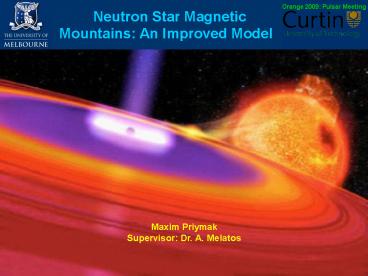Neutron Star Magnetic Mountains: An Improved Model
1 / 12
Title:
Neutron Star Magnetic Mountains: An Improved Model
Description:
2) B distorted Equilibrium NS asphericity. 4) Spin/Dipole axes misaligned Q 0 GW ... MHS Equilibrium: |B|max and ?max versus Maccreted. Attained ?max realistic (cf. ... –
Number of Views:29
Avg rating:3.0/5.0
Title: Neutron Star Magnetic Mountains: An Improved Model
1
Neutron Star Magnetic Mountains An Improved
Model
Orange 2009 Pulsar Meeting
Maxim Priymak Supervisor Dr. A. Melatos
2
Overview
- Accreting Neutron Stars (NS) as Gravitational
Wave (GW) sources - Magnetic mountain mechanism
- Improved magnetic mountain model
- Implemented more realistic EoS
- GW detectability decreases
- Motivation
- Quantify GW detectability of accreting NS by
LIGO/ALIGO - Construct GW search templates
- Infer NS properties (Maccreted, conductivity etc)
3
Accreting Neutron Stars
- Accreting Neutron Stars (NS)
- X-ray sources (LMXB/HMXB)
- NS spin up
- NS spin measurements
- X-ray pulsations/Burst oscillations/QPO
- Spin distribution cut off gt 700 Hz
- None at Obreak up (1500-3000 Hz)
- NOT a selection effect
- 2 mechanisms explain this
- Gravitational Wave (GW) emission
- Propeller effect
- Dominant mechanism Inconclusive
- both contribute
4
Magnetic Mountain
- Current model deficiencies
- Rigid crust no sinking
- Irrotational no FCORIOLIS
- Constant BCs no crustal freezing
- Isothermal no variable resistivity
- No inclination unrealistic
- Ideal isothermal EoS (P cs2?)
unrealistic
- Accretion driven (LMXB/HMXB)
- B confines matter
- 1) PHYDROSTATIC gt PMAGNETIC Matter
Spreads - 2) B distorted Equilibrium NS
asphericity - 4) Spin/Dipole axes misaligned Q ? 0
GW - Advantages (as GW emitter)
- Known position and/or signal f (X-ray / Optical /
Radio) Persistent - Current Models
- 2D (Payne Melatos 2004)
- Axisymmetric MHS equilibrium
- Stable
- 3D (Vigelius Melatos 2008)
- Non-ideal MHD
- Stable
5
Solving the MHS equilibrium
Lorentz force (pressure tension)
- Supplemented with
- EoS
- Mass-flux Constraint dM/d?final dM/d?initial
dM/d?accreted
Pressure gradient
Gravitational force
Net Force
6
MHS Equilibrium Dipole Moment (µ) and
Ellipticity (e) versus Maccreted
- 2 Feasible EoS (P K?G)
- Degenerate Neutron EoS K 5.4e4 (SI), G 5/3
- Relativistic Degenerate Electron EoS K 4.9e9
(SI), G 4/3 - (cf. Ideal Isothermal EoS P cs2? )
7
MHS Equilibrium Bmax and ?max versus Maccreted
- Attained ?max realistic (cf. Ideal Isothermal
EoS) - Above Bcracking plastic flow ?
8
Magnetic Mountain Ideal Isothermal EoS
Maccreted 3.3x10-5 M?
9
Magnetic Mountain Adiabatic EoS
Degenerate n EoS
Maccreted 3.3x10-7 M?
Degenerate Relativistic e- EoS
Maccreted 3.3x10-8 M?
10
LIGO/ALIGO Estimates
- GW strain h is
Ma 10-4 M?
Ohmic diffusion arrests mountain growth
Ma 10-5 M?
Ma 10-6 M?
Ma 10-7 M?
Ma 10-8 M?
Ma 10-9 M?
No observed NS that spin fast enough
11
Current Work
- Extend to realistic Maccreted
- Implement Realistic Nuclear EoS
Future Work
- Crustal freezing / sinking
- Compute feedback b/w mountain and magnetosphere
Cornell Collaboration - Application to X-ray bursts
- Light curves cyclones / Episodic decay of the
mountain - WHY?
- Quantify the effects on GW detectability by
LIGO/ALIGO - Construct GW search templates
- Infer NS properties (Maccreted, conductivity etc)
12
The End
Thank you for your attention.
Any Questions?































